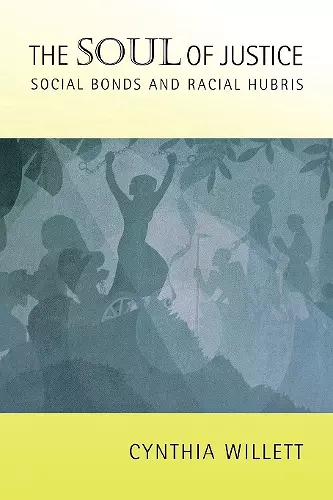The Soul of Justice
Social Bonds and Racial Hubris
Format:Paperback
Publisher:Cornell University Press
Published:21st Aug '01
Currently unavailable, and unfortunately no date known when it will be back
This paperback is available in another edition too:
- Hardback£108.00(9780801438912)

Cynthia Willett brings together diverse insights from social psychology, classical and contemporary literature, and legal and justice theory to redefine the basis of the moral and legal person.Feminists, communitarians, and postmodern thinkers have made clear that classical liberalism, with its emphasis on individual autonomy and excessive rationalism, is severely limited. Although she is sympathetic with the liberal view, Willett finds it necessary to go further. For her, attention to the social dimensions of the family and civil society is critical if issues of race, gender, class, and sexuality are to be taken seriously. Interdependency, not autonomy, is of increasing significance in an era of globalization.Willett proposes an alternate normative theory that recognizes the impact of social forces on individual well-being. Citizenship in a democracy should not be defined solely on the basis of rights to autonomy, such as bare rights to property or free speech, she explains. Rather, citizenship should be defined first of all in terms of the rights, responsibilities, and capacities of the social person.It is within the African American tradition of political thought that Willett finds a more useful definition of human identity and political freedom. The African American experience offers a compelling vision of social change and a deeper understanding of what it means to be a social person. By focusing on everyday battles against racism, Willett contends, we can gain valuable insight into the meaning of justice.
'Freedom's most sublime meaning is eros.' This is the central claim of Cynthia Willett's powerful new book, The Soul of Justice.... Therein Willett brings together critical theory, care ethics, and other forms of feminist theory, and the 'visionary pragmatism' of African American thought to challenge liberal conceptions of individuality and freedom. Perhaps because love often has been sentimentalized, philosophers have tended to turn to other phenomena, such as alienation, separation, and fear, in which to ground freedom. Understanding eros as something other than sentimentality, however, we can tap into its potential power and increase the chances for racial justice.
-- Shannon Sullivan, Pennsylvania State University * The Journal of Speculative Philosophy *This largely convincing account raises important questions for democracy.... Willett's book sends us in new directions to answer questions with ancient origins.
-- Ange-Marie Hancock, Pennsylvania State University * American Political Science ReviISBN: 9780801487156
Dimensions: 229mm x 152mm x 18mm
Weight: 454g
256 pages